“Oh Superman where are you now.
When everything’s gone wrong somehow.
The men of steel, the men of power.
Are losing control by the hour.”
– Genesis, Land of Confusion
It’s been less than a month since Amazon Prime dropped Season 1 of The Boys and we already have a teaser scene for Season 2 (which was confirmed before Season 1 was even released). In it, we see Homelander as a boy, being conditioned in a sterile white room by the scientists who raised him. When his tutor makes the mistake of volunteering herself to be his “mommy”, the boy hugs her so fiercely that she is killed, “just like the others.” A brief glimpse of a satisfied smirk on his face implies it might have been done on purpose. That’s pretty dark for a superhero show, but that’s The Boys for you.
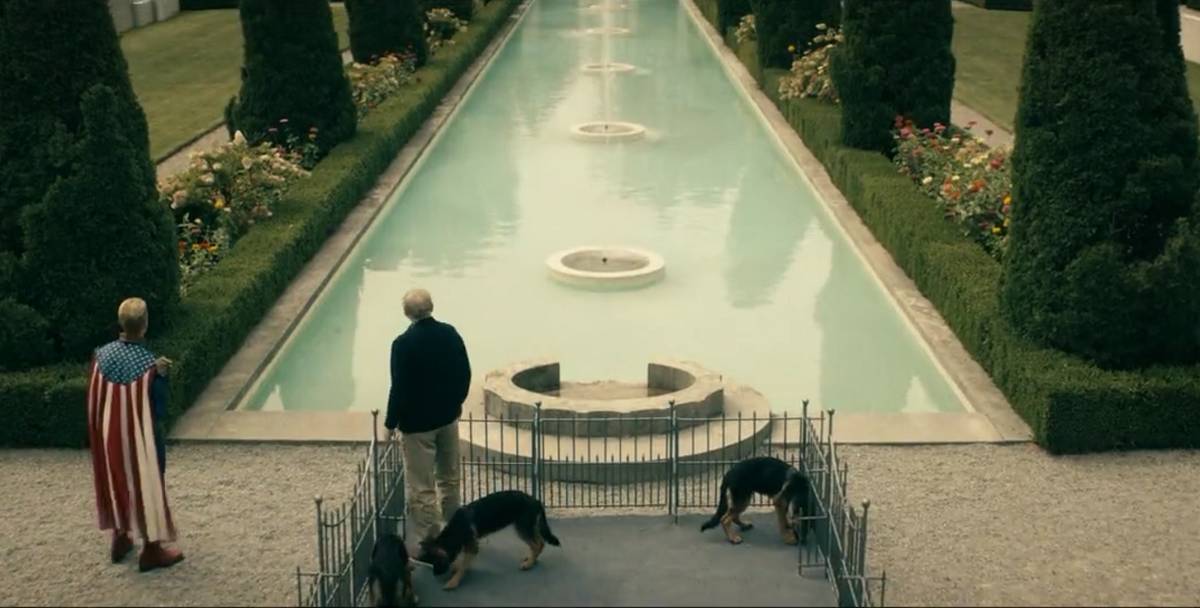
“I try not to get too attached to my subjects.”
Homelander is, of course, a take on Superman from DC Comics. He has the same powers and, to the public at least, the same back story. He’s an alien, crash-landed on Earth as a baby and raised by human parents in the heartland of America. Except that’s not true at all. He is completely human, turned into a “supe” through in vitro injections of Compound V and raised in the aforementioned sterile environment. Homelander never had a mommy or a daddy, and it shows. Underneath his programmed all-American boy persona, he’s a sociopath. His nature is superhuman, but his lack of nurture has left him subhuman.
In Stranger Things, Dr. Brenner tries to raise Eight and Eleven in a similarly sterile environment with the active intent to turn them into sociopaths who will carry out his assassination orders with no moral compunction. But in that case, the girls’ nature ultimately overcomes their nurture. Both escape and use their powers to strike back at “Papa” and bring down the project. Would the story have been different if they were boys? More on that thought in a moment.
In the 1960s, parenting books gave the insane advice that children should not be picked up when crying. The concern, from a pavlovian behaviorist point of view, was that the positive reinforcement of their crying behavior would lead to more crying, and a quiet baby is a good baby. Many orphanages of that era carried out unwitting (and unethical) psychological experiments in real time by following similar advice.
Now we have decades of Attachment Theory research that tells us that kids need a parent’s protection and emotional support at an early age to become well-adjusted functioning adults. Its absence, whether through bad parenting or a lack of parents, might not be a definitive recipe for breeding a generation of sociopaths, but it is a definite risk factor for criminal behavior, drug use, domestic violence, and sexual abuse. Today, a parenting advice book that suggested such a thing would be considered monstrous.
(The pendulum may have even swung too far back in the other direction, resulting in a coddled Generation Z that needs trigger warnings and safe spaces, but that’s a topic for a different article.)
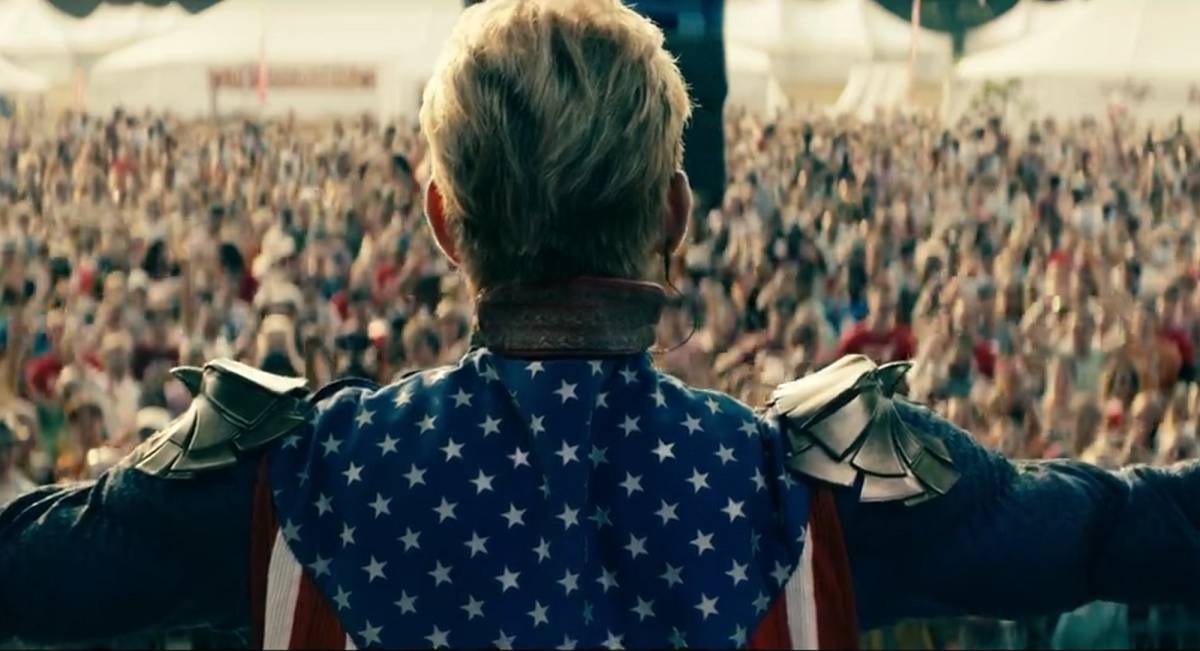
“Your brand is hope, baseball, America, sunshine.”
This all mirrors the Alignment Problem in Artificial Intelligence (AI). How do we make sure that something we create, that will certainly be more powerful than us in many ways, stays aligned with our goals? For example, we could create a “paperclip maximizer” with the goal of manufacturing paperclips in the most efficient and productive manner. Only to have it take over the Earth and turn all the planets in our solar system, including this one, into raw materials for the project. Oops.
If we want to encode AI with human values, one of the proposed solutions is that we need to raise them as humans. This is what happened with Clark Kent. He was raised by humans, as a human. He learned truth, justice, and the American way first hand. He has a secret identity that allows him to mingle among his human friends and family, because he cares about them. Homelander has merely been programmed with the classic 1950s era American values of mom, baseball, and apple pie. He has no mom and he’s most likely never played baseball in his life. He has no need of a secret identity because he sees ordinary humans as “fucking mud people.”
The values that Homelander has picked up on from his upbringing are not those of homeland America, but rather those of corporate America. Maybe this isn’t so much of a problem though. After all, the U.S. Supreme Court would have us believe that corporations are people, entitled to their own moral exemptions and allowed to throw their support behind political candidates and causes. Vought International are the good guys, right? They’re in the superhero business. However, it’s more about the business than the superhero.
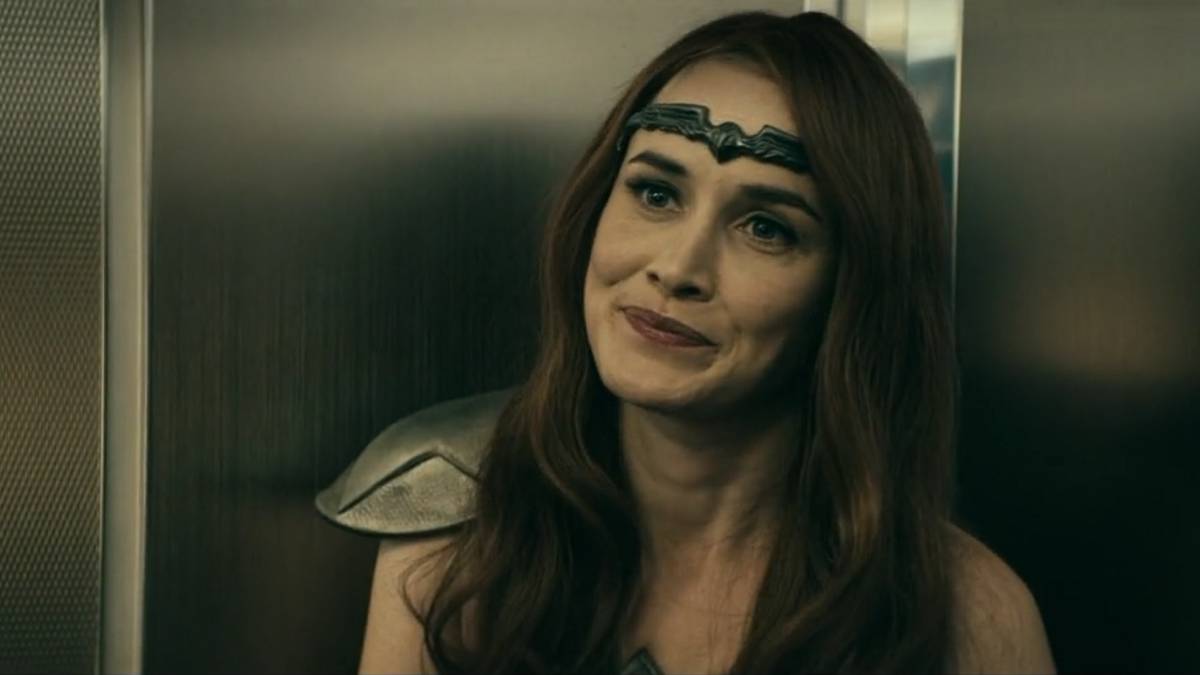
“But, hey, as long as you’re trending, right?”
Vought has departments for Risk Assessment, Crisis Management, Legal, Marketing, and Public Relations. They have flashy shareholder meetings. All of their heroes have a carefully groomed “brand”, with backstories invented or tweaked by the PR department (like when A-Train is asked to remove the gun violence from his tale). They have an entire cinematic universe built around The Seven and their large catalogue of secondary heroes. Stillwell, as second in command, is pushing hard to open up a new business market, getting Vought into the very lucrative defense industry.
Much of this business model is built around celebrity and image. When Starlight has her team-up with The Deep, Vought cameramen are there to capture the crowd-pleasing PR moment (“people love a team-up”). Stopping the crime is somewhat secondary. When Homelander kills a lone wolf shooter, he empties a few rounds into Queen Mauve to preserve the illusion that they were shot at first. And of course, in the most egregious example, Homelander won’t even save two people from Trans-Oceanic Flight 37 for fear that they would “tell the world that we left the rest of them to fucking die.”
When a civilian is injured, as Hughie correctly points out, Vought never exactly apologizes. They send their regrets and their sympathies, but an apology would be an admission of wrong doing. Instead, they pay off victims and make them sign non-disclosure agreements. Their only real moral standard is the company’s bottom line. Their duties are not to their customers or their community. They only serve their shareholders, to make more profit.
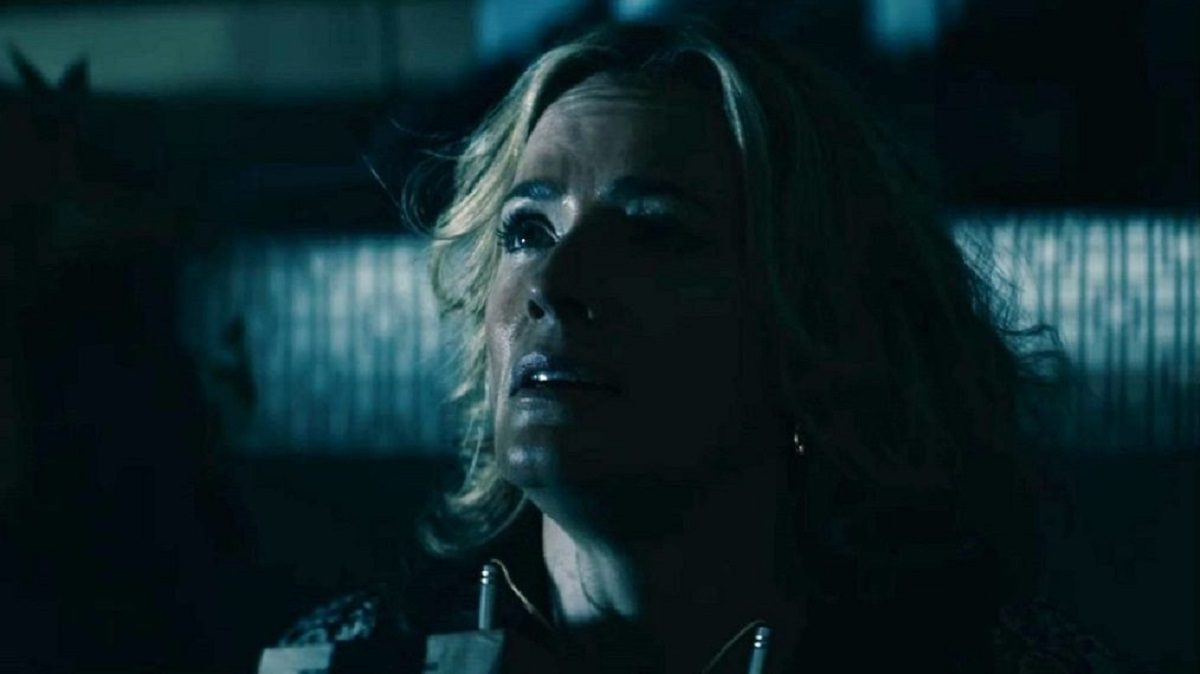
“I’m scared…of you.”
Twenty years ago, two students walked into Columbine High School in Colorado and kicked off a new era of fear, where “duck and cover” drills have been replaced with “active shooter” drills. In the immediate aftermath, there was a lot of blame on the parents. How could they not know what was going on? But as more and more of these school shootings happened, there was less and less talk of blaming the parents. The bad parenting practices at play here were widespread in our society. Economic pressures were making the stay-at-home mom extinct. Academic pressures were encouraging parents to put kids on mind-altering drugs. The online world was making it harder and harder to monitor what your kids were getting into.
Terrorist attacks in the 1990s and 2000s further showed us that planes flown into buildings, trucks driven into crowds, and even common fertilizer could be weaponized by those determined to wreak havoc and cause fear. Whether you want to blame a lack of mental health care, violent video games, twisted ideologies, or economic injustices, there is one common factor to all of these incidents that cannot be denied. Males. Men and boys. We all live in fear of “the boys” to some extent, because it’s boys, almost exclusively, who are committing these atrocities.
Women have additional reasons to live in fear of “the boys.” From frat houses to casting couches, the recent #metoo movement has shown how all too prevalent sexual assault still is today. Starlight has her #metoo moment with the Deep, of course, but he’s not the only bad apple among the boys on The Seven. Translucent is a peeping tom, A-Train murders his girlfriend, and Homelander may be a flat-out rapist.
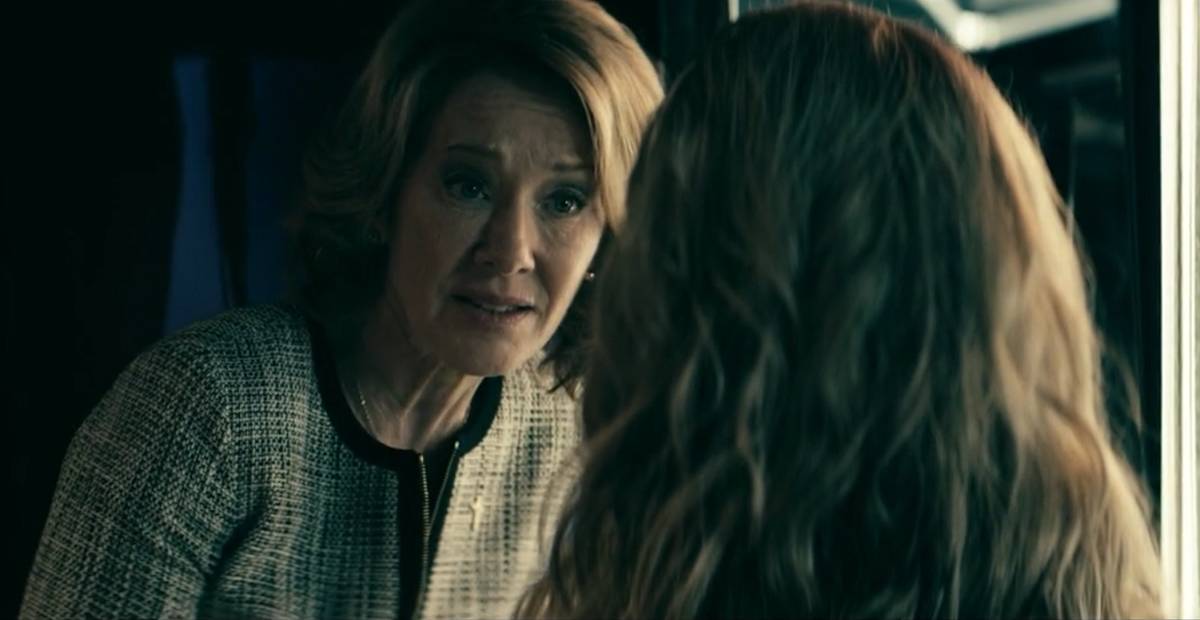
“This isn’t about you.”
Another Colorado black mark in parenting was the death of JonBenét Ramsey in 1996. She was a 6 year old girl who was being entered into child beauty pageants by her mother, the chief suspect in her still unsolved murder. The sensationalism surrounding the case led to a national conversation about the morality of these pageants, where little children were made to look “sexy” and potentially exposed to sexual predators, just to satisfy the narcissistic urges of their parents. Eventually this would lead to reality TV shows, like Stage Moms, tapping into our baser instincts to not look away from train wrecks.
This was the world Starlight was brought up in. While Homelander and A-Train were suffering from a lack of parenting in their lives, she had the opposite problem. Her mother was trying to live vicariously through her, using her daughter for “a chance at an extraordinary life.” She dolled Annie up and dragged around to “little miss hero” pageants. She sacrificed her husband, and really, her daughter too. Now, as Annie begins to peel back the veneer on the surface of her life, she has no idea who she is supposed to be.
The contrast with Homelander is interesting. Both were raised to be superheroes. Both were indoctrinated with middle-American values and religion. However, Starlight experienced these things first hand, whereas Homelander was only told about them. Starlight’s mother may be a bad parent, but at least she did have that one parent—a parent who sacrificed, in her own twisted way, for her daughter. Your real heroes growing up are your parents, and part of the pain of growing up is realizing that they are not heroes at all, but just ordinary human beings like yourself.
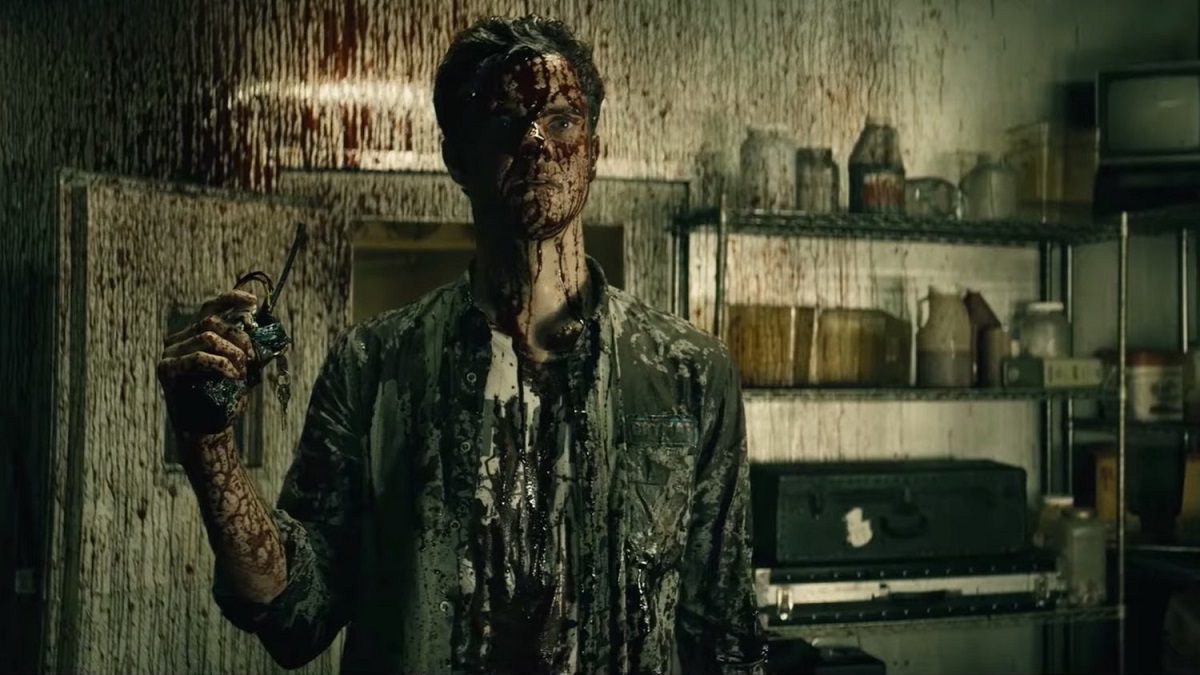
“You’re a good boy.”
The other prominent single-parent relationship in The Boys is between Hughie and his dad. Prior to Robin’s death, Hughie was pretty much becoming his father. He was a good boy, a sensitive boy, but also unable to build up the courage to ask his boss for a raise. Hughie didn’t have “the fight” in him, a trait passed on to him directly by his father.
After Robin’s death, Butcher steps in and takes over the father figure roll in Hughie’s life, pushing him to get revenge rather than letting it go. Initially, it takes effort for Hughie to find “the fight.” He almost lets Translucent walk away. Over the course of Season 1, he figures out that Butcher’s way isn’t for him either. Hughie purposely gets captured to save his new friends when Butcher walks away. During their escape, he stands up to A-Train and, in a nice full-circle moment, even saves his life. Earlier, when Hughie rescued his dad from A-Train, he was proud of his son for standing up for himself. Because a good parent wants their child to break free and turn out better than themselves.
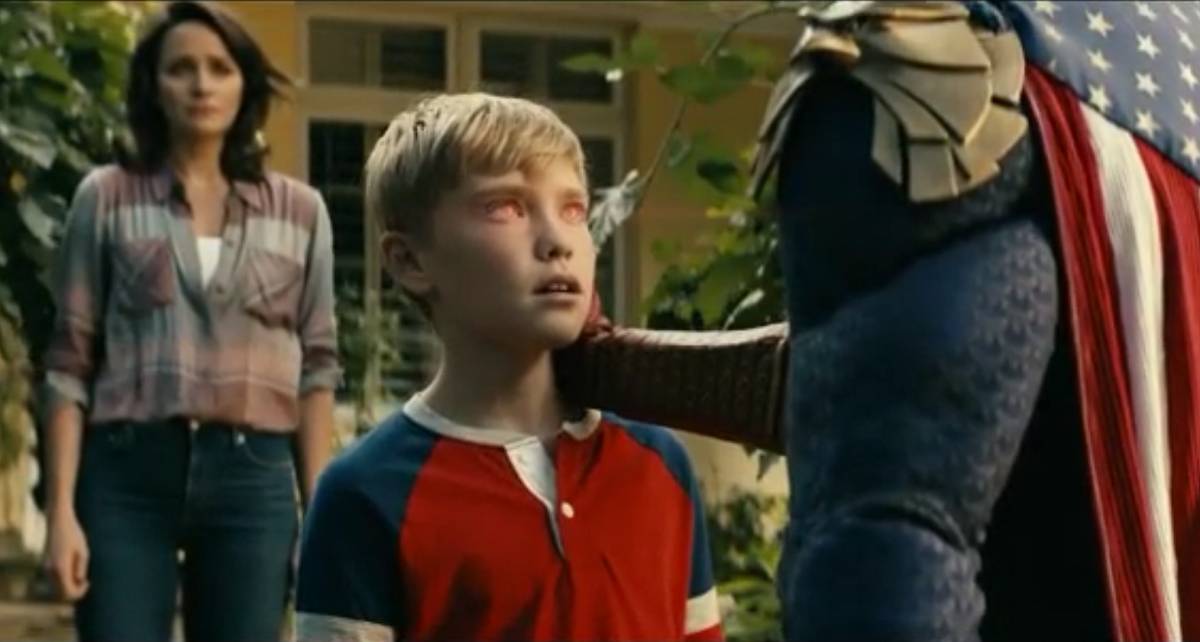
“We are a family.”
The world of superheroes includes a lot of famous orphans. Think Peter Parker, Clark Kent, and Bruce Wayne. In the comic books, the hero usually has a surrogate parent step in to teach them about their “great power” and “great responsibility.” Holding a dark mirror to those golden age superhero stories, The Boys presents us with a handful of heroes raised by bad parents or no parents at all. The results reflect the darker aspects of modern society: the worship of celebrity, the promotion of self-interest, the glorification of violence. The male members of The Seven in particular, are ticking time bombs of rage and frustration, abusing their power and responsibility.
Season 1 of The Boys ended almost too abruptly. Seemingly every story was halted in mid-arc, rather than at a cliff-hanger ending, with the possible exception of Homelander. He’s taken back the reigns of his life and ended his controlling relationship with Stillwell, and possibly with the Vought corporation as well. Now that he has discovered that he is a father, what will he do? One thing is for certain, he’s not going to be a good parent.

